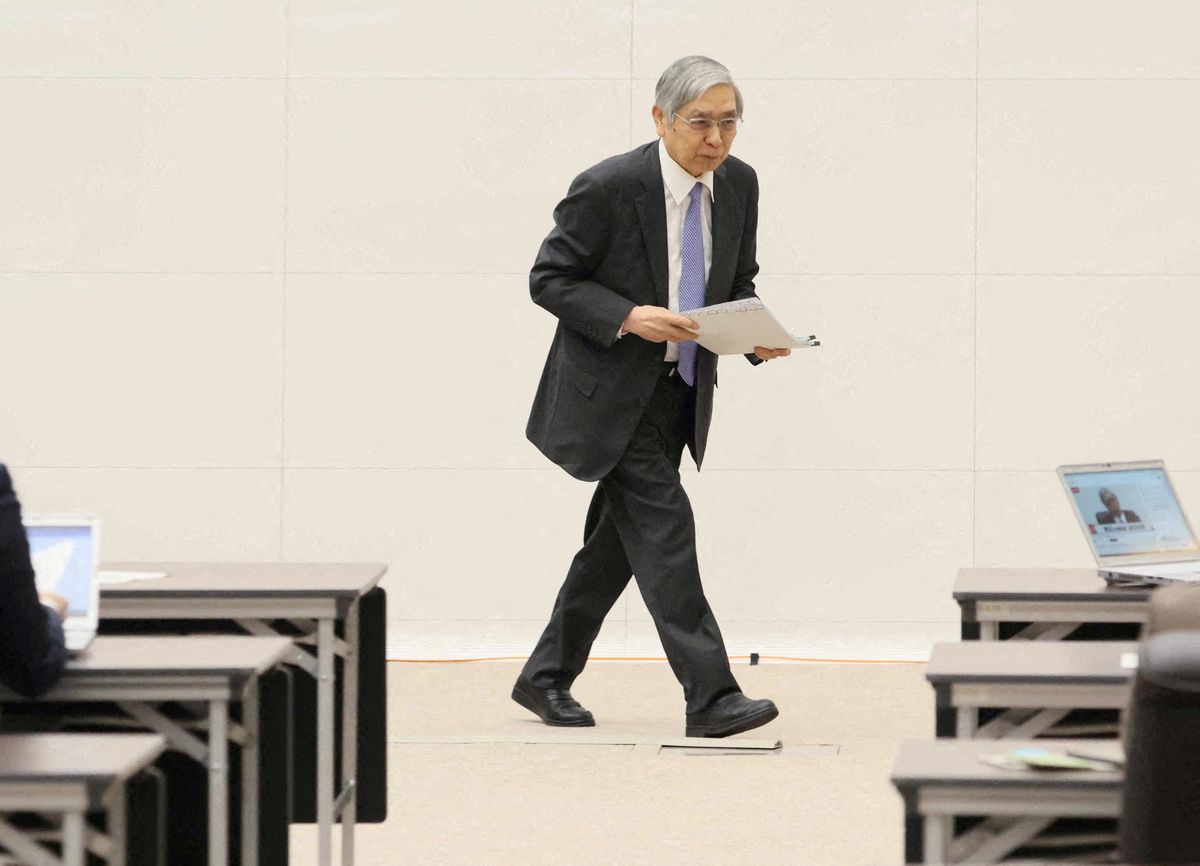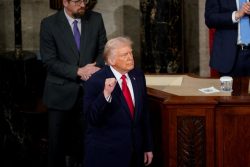
Bank of Japan (BOJ) Governor Haruhiko Kuroda leaves after his last news conference as Japan’s central bank chief at the BOJ headquarters in Tokyo, Japan April 7, 2023.
12:56 JST, January 8, 2025
TOKYO (Reuters) – The Bank of Japan will likely keep raising interest rates in the coming years as inflation appears on track to sustainably hit its 2% target, said former governor Haruhiko Kuroda, known for launching a decade-long, massive stimulus program.
Despite the expected rate hikes, Japan’s economy will achieve growth exceeding 1% this year and beyond as rising real wages underpin consumption, Kuroda said in a research paper submitted to the House of Representatives’ annual journal issued on Dec. 24.
“There seems to be no change to (the BOJ’s) basic stance of gradually raising interest rates with an eye on economic and price developments,” Kuroda said.
“That’s because a positive wage-inflation cycle is continuing, which is likely to keep inflation sustainably and stably at its 2% target,” he said in the paper.
It was uncertain how much the BOJ will eventually raise rates due to the difficulty of estimating the level that neither cools nor overheats Japan’s economy, Kuroda added.
Higher borrowing costs will likely not hurt firms much as they hold abundant cash, while households will reap “big gains” from rising interest paid to their huge savings, Kuroda said.
The largest pain may fall upon the government due to the increasing cost of funding Japan’s huge public debt, he said.
The balance of government bonds – at ¥1,100 trillion ($6.96 trillion) – is now triple the size of 2000. If bond yields rise to the average level of 2.7% hit back then, annual interest payments will reach ¥30 trillion , Kuroda said, calling on the need to get Japan’s fiscal house in order.
In the budget for next fiscal year, the government plans to spend ¥10 trillion in interest payments.
Under Kuroda, the BOJ launched a huge asset-buying scheme in 2013 that later combined negative interest rates and bond yield control, in a bid to fire up inflation to its 2% target.
While proponents praise the steps for pulling Japan out of economic stagnation, critics point to various side-effects such as the hit to commercial banks’ profits from prolonged low rates and market distortions caused by its huge asset purchases.
Kuroda defended the policies, saying the damage to regional banks’ profits were limited. Deteriorating bond market function was a necessary cost to sufficiently reflate growth, he added.
Under incumbent governor Kazuo Ueda, the BOJ ended Kuroda’s stimulus measures in March and raised short-term interest rates to 0.25% in July. Ueda has signaled a readiness to raise rates further if Japan continues to progress towards durably reaching 2% inflation.
$1 = ¥158.0300
Top Articles in News Services
-

Survey Shows False Election Info Perceived as True
-

Hong Kong Ex-Publisher Jimmy Lai’s Sentence Raises International Outcry as China Defends It
-

Japan’s Nikkei Stock Average Touches 58,000 as Yen, Jgbs Rally on Election Fallout (UPDATE 1)
-

Japan’s Nikkei Stock Average Falls as US-Iran Tensions Unsettle Investors (UPDATE 1)
-

Trump Names Former Federal Reserve Governor Warsh as the Next Fed Chair, Replacing Powell
JN ACCESS RANKING
-

Producer Behind Pop Group XG Arrested for Cocaine Possession
-

Japan PM Takaichi’s Cabinet Resigns en Masse
-

Man Infected with Measles Reportedly Dined at Restaurant in Tokyo Station
-

Israeli Ambassador to Japan Speaks about Japan’s Role in the Reconstruction of Gaza
-

Videos Plagiarized, Reposted with False Subtitles Claiming ‘Ryukyu Belongs to China’; Anti-China False Information Also Posted in Japan
























